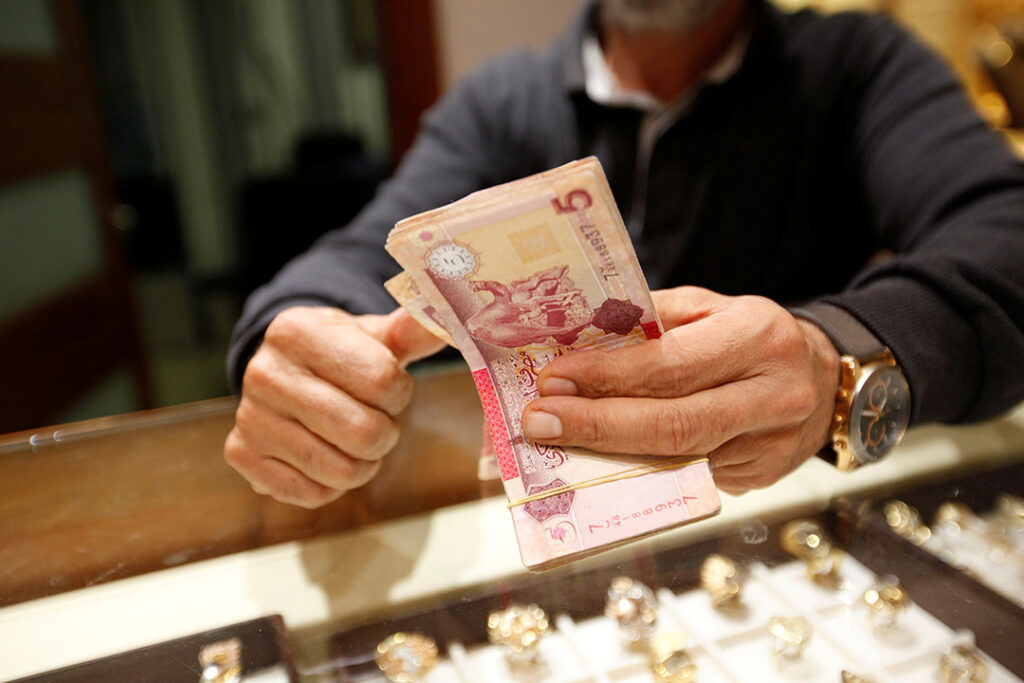ADF STAFF
Russia faces fresh allegations of flooding Libyan markets with counterfeit banknotes in another bid to further destabilize the country. The Kremlin has a documented history of sending counterfeit currency to Libyan National Army (LNA) leader Field Marshal Khalifa Haftar.
The Central Bank of Libya (CBL) announced in April that it began withdrawing the first and second prints of 50-dinar (just more than $10) banknotes from circulation after officials discovered counterfeit prints.
Russia is accused of printing the fake money at a farm on the outskirts of Benghazi, Haftar’s base. Russia’s Wagner Group of mercenaries, now known as the Africa Corps, supports the LNA.
The CBL asked banks in Libya and their branches to allow the public to present the banknotes and deposit them in their accounts. It urged banks to exercise due diligence to prevent counterfeit currency from being passed and it published a presentation that showed the minute differences between legitimate and counterfeit 50-dinar prints.
The country is divided between Haftar’s government in Benghazi and Libya’s internationally recognized Government of National Accord (GNA) in Tripoli, which Haftar is attempting to overthrow.
Jalel Harchaoui, an associate fellow at the Royal United Services Institute, said Haftar has intensified efforts to strengthen his ties with the Kremlin since August 2023.
“It’s important to emphasize that Russia’s assistance to Haftar rarely comes without financial demands,” Harchaoui told The New Arab. “Haftar is always required to cover the expenses incurred by the Russians active on Libyan soil — in military and other domains.”
A $150 million dispute between Haftar and Wagner emerged in 2020 after a contract between the parties ended. Haftar was accused of not paying the group after the combined forces lost seven cities over a 24-hour stretch in 2019, the year the warlord launched a sustained assault on Tripoli that ultimately failed.
At the time, Wagner was bringing “fighters — not so experienced — from Syria, Belarus and Serbia,” a military source close to Haftar said in a report by the Arabic Post news website.
In September 2019, five months into Haftar’s attack on Tripoli, Malta officials intercepted a shipment of Russian-made dinars en route to Haftar. Nearly 4.5 billion dinars were shipped from Russia to the eastern port city of Tobruk in the first half of 2019, coinciding with the start of the Tripoli war, Reuters reported. Another billion dinars was delivered to the east in 2016, according to the Libya Herald.
Legitimate Libyan dinars issued by the GNA in Tripoli are printed in the United Kingdom. Joint Stock Company Goznak, a Russian state-owned company, printed the illegitimate bills seized in 2019 and 2020.
As with the current crop of counterfeit cash, the previous fake Libyan dinar bills looked almost identical to official bills. By some estimates Haftar’s government flooded the country with nearly 12 billion Russian-made dinars between 2015 and 2020.
The fake bank notes were used to pay Haftar’s fighters and were found all over the country. They fueled inflation, drove down the value of the dinar, and undermined the official currency supplied by the central bank in Tripoli, according to Libyan economic analyst Mukhtar Al Jadeed.
The primary purpose of the counterfeit currency was to “fund the war on Tripoli,” Al Jadeed told Al-Jazeera.
Officials intercepted a shipment of $1.1 billion in fake dinars bound for Haftar in Malta in the spring of 2020.

